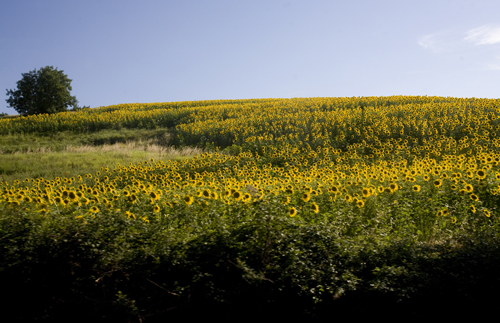 The day was a perfect idea of itself, of what a Saturday afternoon in late spring should be: the sun a buzzing yellow, red barns, white houses, a neat hem of highway skirting the Ohio hills. I should remember what they looked like, what point of sowing-raising-harvest was in motion. Perhaps the earth was a naked dark brown, or pale with shoots promising corn, wheat, soy. I can’t tell you, and that tells you something about me, this Midwesterner who doesn’t know what fields look like in May.
The day was a perfect idea of itself, of what a Saturday afternoon in late spring should be: the sun a buzzing yellow, red barns, white houses, a neat hem of highway skirting the Ohio hills. I should remember what they looked like, what point of sowing-raising-harvest was in motion. Perhaps the earth was a naked dark brown, or pale with shoots promising corn, wheat, soy. I can’t tell you, and that tells you something about me, this Midwesterner who doesn’t know what fields look like in May.
In my car I was incongruous, still dressed from the morning’s work of cross-examining English undergraduates in business casual, black heels, an overly large necklace. I was the fearsome Outside Examiner, headed back to my own college in Michigan. But first I needed photographs. I had written a story in the voice of a girl from this county, a reluctant girl assigned to write a school report about her hard luck life, who uses pictures to take up space: an empty Main Street, a down-at-heel wooden house, an Amish farm. I was naïve enough to think these things would appear around every corner. I had once lived in this county for three years, had written my character a desperate life inside it, and still pictured it chockfull of cheerful barns.
I took a random turn off the highway. There were no convenient shoulders or scenic farm overlooks. Just endless little roads bound with wire fencing, modern brick ranch homes, bright green John Deeres outside metal outbuildings. Trucks rode my tail. I was reluctant to slow down, reluctant to stop; I couldn’t imagine nosing into a grassy ditch or pulling into a stranger’s driveway. Locals whipped around me angrily.
I had no maps, nothing more detailed than a fifty-state road atlas to convince myself I wasn’t lost. I was following an especially tiny road that I worried might be a private drive, when I finally found it: home and barn and silo, tucked in the crook of gentle hills, the white road curving towards a gate as if calling to home. Only one little wisp of power line to erase to make it suitably Amish.
I pulled over. The turn-in wasn’t gravel or dirt but round, fist-sized rocks. I nearly fell before I stepped out of my shoes, curved my bare feet against the warm stones. I clicked my tiny point-and-shoot camera, nothing bulky or professional, nothing I could pretend to be a journalist or photographer with.
I heard the sound of an engine, and over the crest of a hill came a tractor and driver. I was instantly, piercingly self-conscious. The driver didn’t move, didn’t raise a hand. I didn’t even know if he’d seen me. I could have called a greeting, apologized for the trespass, chatted about the day’s work. I wasn’t doing anything terribly wrong. But all of a sudden I felt with every grain that I was. Heart racing I leapt into my car, tossed the camera on the passenger seat, made my bumpy getaway.
An hour down the road I realized I was driving barefoot. I’d left my shoes behind, sitting neatly side by side like I’d been sucked straight up by the Rapture. I regretted their loss and then laughed out loud and then pictured the mystery I’d left to whomever found them. I wondered if I’d been seen, if the shoes would be connected to that strange woman who came, took pictures, left footwear like a receipt. I imagined the farmer a wife to give them to. I scolded myself for not thinking that the farmer might be a woman, might find a use for some sober black heels.
“If these shoes could talk,” she’d say, but all they’d say is this: I took your house and made it someone else’s house; I inhabited it with lives that were not yours, nor mine; I invent stories about places that do not belong to me and pretend that by writing they will. Writers have to think this—don’t we?—but then a tractor churns into view and I flee, the barefoot proof that I own nothing.
If I had stayed to speak, instead let me listen: Tell me what those black shoes looked like. Tell me I had a right to leave them there, to trade them for the image of your land, the idea of your life. Tell me what you were preparing the earth for, when you came over that hill.
—
Caitlin Horrocks lives in Grand Rapids, Michigan, and teaches at Grand Valley State University. The story for which she sacrificed her shoes appears in her debut collection, This Is Not Your City (Sarabande 2011). Other stories and essays appear in The Best American Short Stories 2011, The PEN/O. Henry Prize Stories 2009, The Pushcart Prize XXXV, The Paris Review and elsewhere, and have won awards including the Plimpton Prize and a fellowship from the Bread Loaf Writers’ Conference.
Photo by Annie Agnone
